The Handmaid’s Tale: A Cautionary Story For Our Generation
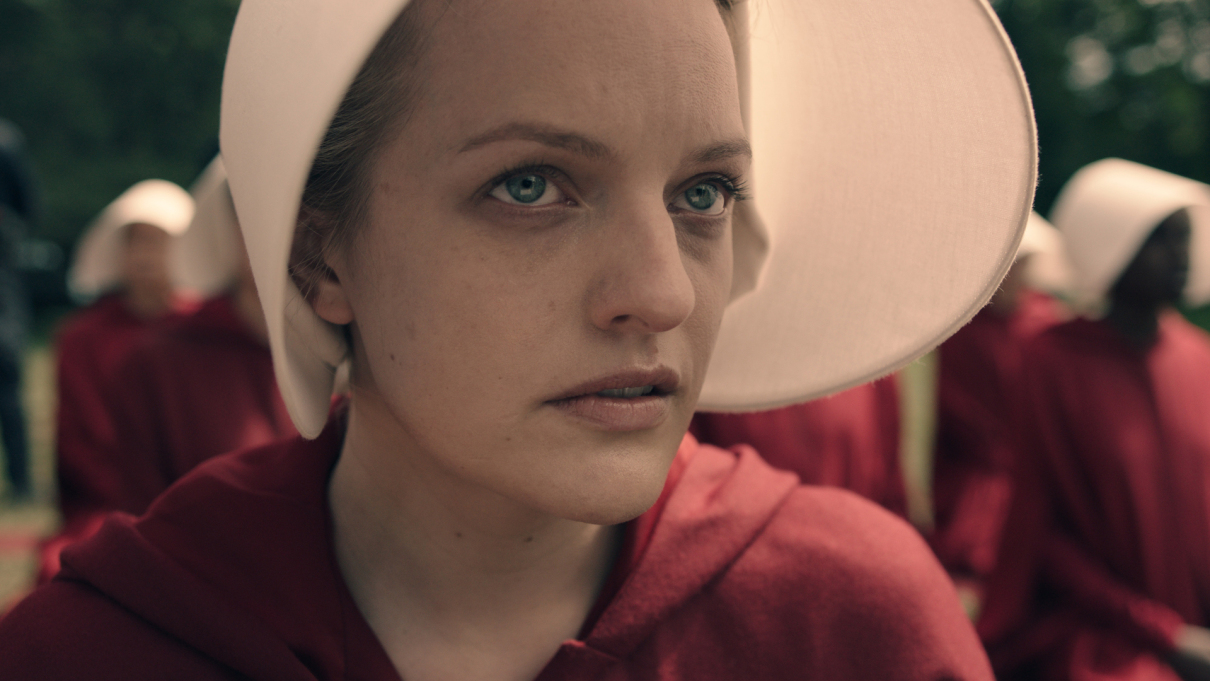 Thirsty for JUICE content? Quench your cravings on our Instagram, TikTok and WhatsApp
Thirsty for JUICE content? Quench your cravings on our Instagram, TikTok and WhatsApp
On June 2nd, the world woke up to the horrifying news that Donald Trump had pulled out of the Paris climate accord. Global warming and the state of the planet was something that the Trump administration had been very vocal about beforehand – that climate change was a myth and the United States of America would not be wasting money on mitigating the effect of human development on the environment.
Post-apocalyptic visions of the world began to spring forth, whether in news articles or in Facebook statuses. Without one of the largest countries in the world funding and contributing to keeping our planet alive, what would become of us humans?
While The Handmaid’s Tale is based on a 1985 Margaret Atwood novel, and not on the orange President’s regrettable choices; Netflix-competitor Hulu have chosen the perfect time to release what is already being called one of the best TV series of the year and one that provides chilling insight into what the future really could be not too long from now.
The Handmaid’s Tale is a speculative dystopia set in the nation of Gilead, a totalitarian fundamentalist theocracy borne from the ashes of the United States of America as we know it. In the wake of unrestricted pollution and climate change, most of the world’s women are now infertile, and the human race is dying. In Gilead, the solution to this is simple – to turn all of Gilead’s remaining fertile women into sex slaves, formally known as Handmaids, whose sole purpose in life now is to bear a child for the leaders of the new nation.
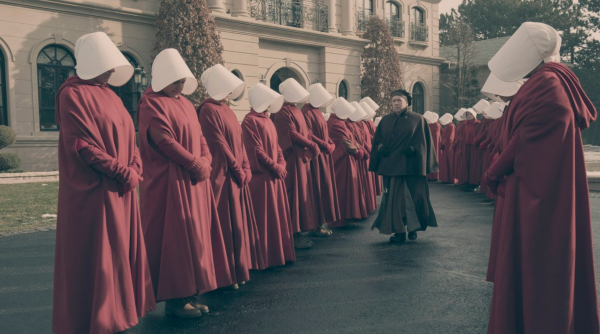
The Handmaids are given a new name to suit their new status as their Commander’s property, adding the word ‘of’ before their master’s name to demonstrate their complete subservience. Opting out is, of course, not that simple. Any rebellion amongst the Handmaids is violently crushed according to religious scripture – “if your right eye causes you to sin, tear it out and throw it away” – and Handmaids who fail to bear a child after several attempts with different leaders are sent to the Colonies, Gilead’s equivalent of labour camps.
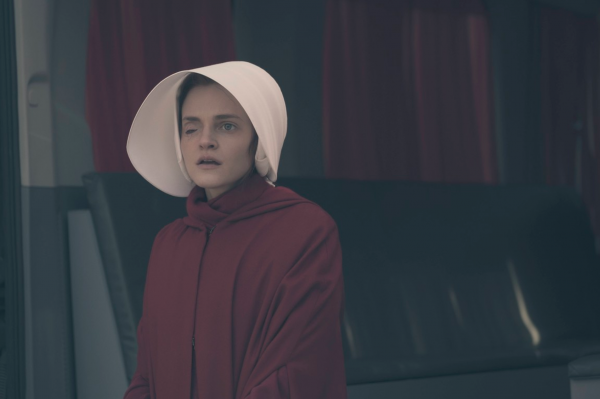
Gilead is an unforgiving nation run by no less than terrorist dictators. Having come to power through an attack on Congress which started America’s second Civil War, it is no surprise that the administration’s leaders are given the militaristic title of Commander, and any sign of insubordination may result in a sinister black van pulling into the drive the next morning to bring the offender to their death or incapacity. The Bible has been bastardised and interpreted in a new, ultraviolent manner; so that “the State’s mercy” is equivalent to a public hanging, and the bodies of other religious folk and “gender traitors” (Gilead’s term for homosexuals) are put on public display.
Early on in the series, Handmaid-in-training Janine (Madeline Brewer) is initially feisty and rebellious, but returns a shivering mess from having her eye torn out as punishment. The main character, Offred herself tries to escape the Handmaid training facility, is taken to a locked room where her feet are whipped until she can no longer walk. The Handmaids are constantly told that they should be thankful for all they have, compared to those in the Colonies and those already dead, but the grim reality of their situation is apparent. The struggle that awaits them is on a whole other twisted level altogether, to the point where death has been seen as the more preferable option.
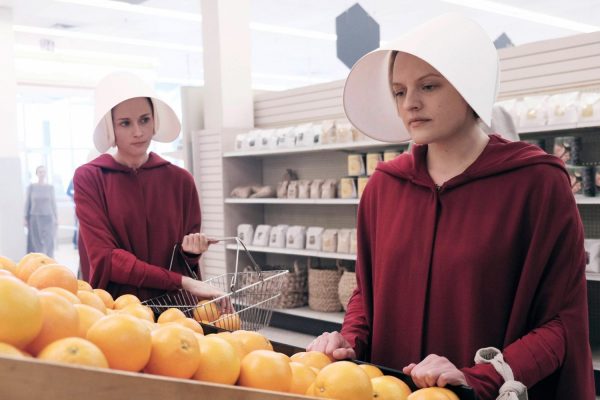
The protagonist of The Handmaid’s Tale, Offred (Elisabeth Moss), is mired deep in all of this. Having failed to cross the border into Canada and elude Gilead’s authorities, Offred – formerly named June Osborne – has been separated from her young daughter and husband; the latter she presumes has been shot by the authorities. After initiation into life as a Handmaiden at the hands of brutal instructor Aunt Lydia (Ann Dowd), she is transferred to the house of Commander Fred Waterford (Joseph Fiennes), whom she is expected to have sex with in the presence of his wife a few times every month in an outlandish, ritualistic fashion.
Her arrival creates extra strain on an already brittle household, though – Waterford’s wife Serena (Yvonne Strahovski) is resentful of Offred as a result of her own insecurities and the increasingly obvious fact that her husband no longer seems to love her; Waterford’s driver Nick (Max Minghella) clearly harbours feelings for Offred, and Commander Waterford himself seems strangely keen on developing a ‘connection’ with Offred in secret, away from the prying eyes of his wife. Offred too has her own demons – her best friend Moira (Samira Wiley) is missing, concerns for her daughter still plague her, and her companion Handmaid Ofglen (Alexis Bledel) is slowly but surely tempting her to lend a hand in a shadowy underground resistance that may or may not exist. The Handmaid’s Tale is presented partly through flashbacks, which are a handy tool allowing the writers to give viewers only a trickle of information at a time, creating a huge build-up of suspense in two different timelines that culminates in the season’s devastating finale.
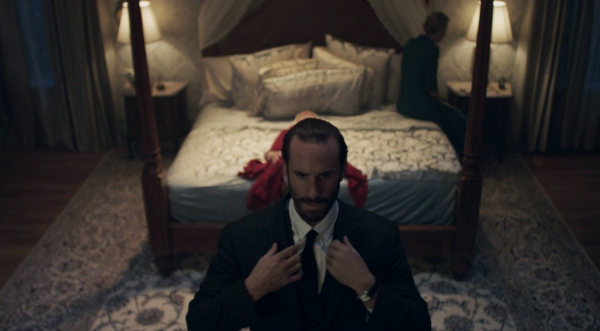
The Handmaid’s Tale is not particularly easy to watch, but this is also where its strengths lie. By showcasing the obvious inequality in Gilead’s society head-on with no commentary, viewers are left to determine for themselves what crosses the line and what doesn’t – but each and every character’s action is morally dubious, leading viewers to confront their own stance on morality and social liberties. Neither is any character completely angelic. Offred, who is played brilliantly by Moss, is later revealed to have a slightly dubious past, as well as a cold, calculating mind hidden behind her often stoic façade. Serena Waterford, initially Offred’s biggest foil and one of the most hostile towards her, is more compassionate than she lets on, and her raging internal conflicts regarding her burning desire for a child and the salvation of her crumbling marriage are factors that allow viewers to empathise with her before long. Even Commander Waterford has a glimmer of redemption for his character – he may hold the view that women have a “biological destiny” to reproduce and do nothing more, but his concern for Offred and his fear that she may choose to end her life should she be uncomfortable in any way at his household are innately human and sympathetic.
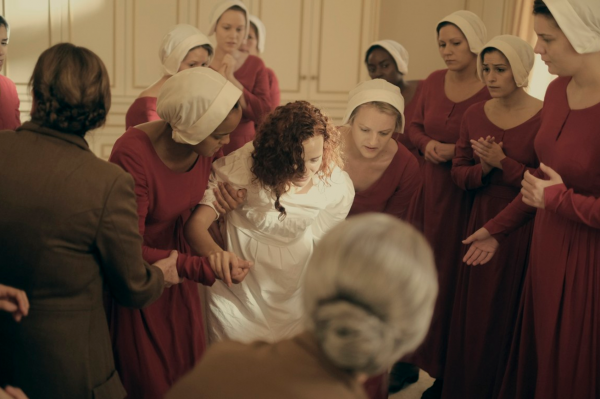
Another incredibly powerful message that the series sends is one of solidarity in times of trouble. In an age when gender inequality is still rife and the world teeters on the brink of uncertainty, The Handmaid’s Tale is a potent reminder that we must all stand together in troubled times. The Handmaids are a tightly-knit group in their suffering; constantly friendly and supporting each other through thick and thin whenever they are allowed to gather. When a man who raped and murdered one of their colleagues is brought before them for judgment, they waste only a few seconds before their collective anger leads them to stone him to death, in a powerful yet conflicting scene that is one of the series’ hallmarks.
When wayward Handmaid Janine (now Ofwarren) gives birth, her fellow Handmaids are all by her side offering words of encouragement and comfort, even though Janine’s borderline insanity and cowering fear of the rules since her punishment didn’t exactly make her the most popular amongst her peers. And after Offred’s punishment leaves her unable to walk to meals, each of her colleagues leaves a morsel of food by her bedside, banding together to secret food away for their helpless friend. The undercurrent of rumours about an underground resistance are also crucial. Signs that somewhere out there, a small group of people are gathering the courage to fight for what’s right, can clearly be heartening for the downtrodden who are beginning to lose hope. These gestures may be small, but they are nonetheless touching, and they constantly show that unity can often triumph over adversity.
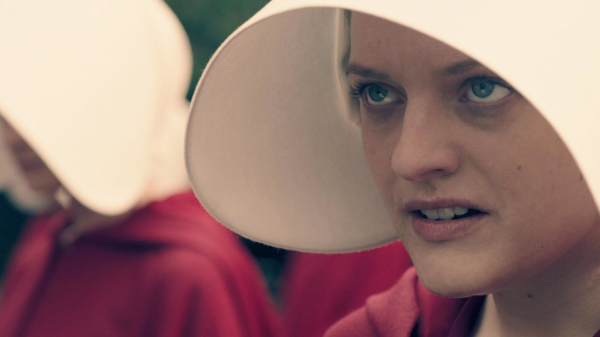
The Handmaid’s Tale is perhaps one of the most important TV series to air today. Barely having finished its run on American television, the series still holds 100% on Rotten Tomatoes and is currently being met with rave reviews in the UK, both for its impeccable cast and its all-too-real vision of humanity’s broken future. It has already inspired protests in the US against bills taking away women’s rights to their own bodies, and is calling for a more in-depth examination of the way gender inequality is detrimental not just to those undermined, but to all of society. It is both a warning and a call to arms – in order to avoid the future taking its worst iteration, we must stand together today against injustice. And with a second season already commissioned for 2018 now that the series is setting headlines alight, it is a good sign that people are beginning to listen.
It’s not all doom and gloom, especially if Lord Buckethead can do anything about it.


 Get Audio+
Get Audio+ Hot FM
Hot FM Kool 101
Kool 101 Eight FM
Eight FM Fly FM
Fly FM Molek FM
Molek FM